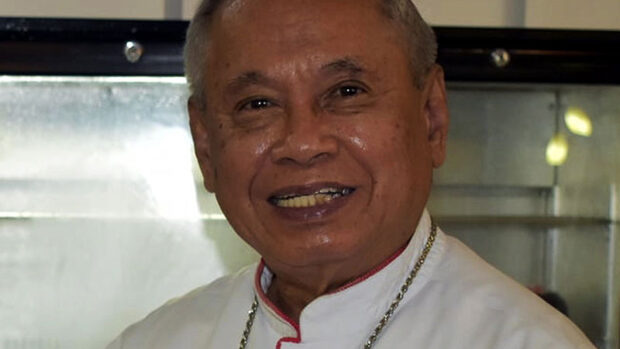Cardinal Quevedo urges renewed dialogues on Mindanao issues
ILIGAN CITY, Lanao del Norte, Philippines — Cardinal Orlando Quevedo, the retired archbishop of Cotabato, has called on Mindanao’s clergy to take up the slack of promoting dialogues among Christians, Muslims and indigenous peoples following the death of Davao Archbishop-Emeritus Fernando Capalla.
Quevedo raised the challenge of reviving the Bishops-Ulama Conference (BUC) in his homily during the funeral Mass in honor of Capalla, fondly called “Bishop Nanding,” at the San Pedro Cathedral in Davao City on Monday.
“We pray that someone among the bishops of Mindanao will again establish another form of BUC so that the dream of Bishop Nanding about peace and dialogue will continue as his living legacy,” said Quevedo.
BUC is a coming together of Catholic, Protestant, and Muslim religious leaders for interreligious dialogue to define a future of peace and justice in Mindanao. It was organized in 1996 by Capalla, Dr. Mahid Mutilan of the Ulama League of the Philippines, and Bishop Hilario Gomez Jr. of the United Church of Christ in the Philippines.
“We began with curiosity and perhaps mistrust with one another. But as we moved on, the members of the [BUC] became friends,” Quevedo recalled.
Article continues after this advertisementHadji Balajadia, a psychology professor at the Ateneo de Davao University, wrote on social media that the BUC was born amid “tumultuous times” when “mistrust was in the air” following the signing of the Final Peace Agreement between the government and the Moro National Liberation Front in 1996.
Article continues after this advertisement“The peace accord was welcomed with utmost ambivalence, if not cynicism, by most Catholic bishops who have a meager grasp of the Mindanao problem,” recalled Balajadia, adding that the three co-founders intended the group “to engage the religious leaders at that time to rally the much-needed support for the newly signed pact.”
Bridging the gap
“As a dialogue space, it functioned as the widest and most respected interreligious dialogue platform of the day, discussing burning Mindanao challenges which cut across issues of peace, development, security, and governance,” she added.
Balajadia said the BUC, through time, became “a locus to gather government officials, religious leaders, civil society, the academe, and the communities to articulate the core principles which define Mindanao peacemaking.”
Moro civil society leader Samira Gutoc credits the BUC for “helping bridge the gap between Muslims and Christians” at critical times in Mindanao’s recent history.
Following the war in 2008, due to the aborted signing of a deal between the government and the Moro Islamic Liberation Front defining the Bangsamoro homeland, BUC embarked on community-based consultations to define a common vision of peace for Mindanao.
The consultations helped consolidate support for peace talks as opposed to war as a means for resolving the Moro rebellion.
Hallmark of life
In 2017, Capalla and Gomez convened a BUC peace conference in Cagayan de Oro City hosted by then Archbishop Antonio Ledesma to help seek a peaceful end to the Marawi siege and douse water on Muslim-Christian tension that reignited due to the crisis.
After the bombing of a Holy Mass last Dec. 3 at the Mindanao State University in Marawi City, “many Christians wanted to retaliate,” according to Quevedo.
“But as Bishop Nanding said, the law of Christ is not a law of retaliation, it’s a law of love, it’s a law which tells us to pray, to love our enemies, to pray for [our] enemies,” Quevedo pointed out. “It is difficult to accept that when one member of your own family might have been killed. But this is his way of life.”
“If I were to write an epitaph for Archbishop Capalla, it would be ‘a bishop of peace and dialogue.’ Peace and dialogue were the hallmarks of Bishop Capalla’s life,” Quevedo said.
Quevedo noted that the BUC “faded away” as Capalla became ill. Before his death, Capalla was the last among the original conveners. Mutilan died in December 2007 and Gomez in December 2022.
Capalla, who died at 89 on Jan. 6, was buried in a crypt at the San Pedro Cathedral after the Mass presided by Davao Archbishop Romulo Valles and concelebrated by Quevedo, Manila Archbishop Jose Cardinal Advincula, Catholic Bishops’ Conference of the Philippines president and Kalookan Bishop Pablo Virgilio David, and 13 other bishops from various parts of the country.
Valles also paid tribute to Capalla for his “unwavering dedication of serving both Catholics and non-Catholics” and for bringing the church “to the peripheries.”
Former President Rodrigo Duterte, accompanied by Senators Christopher “Bong” Go and Ronald dela Rosa and Davao City Rep. Isidro Ungab, attended the funeral rites. In Capalla’s honor, a Holy Mass was also celebrated on Monday at the Saint Michael the Archangel Cathedral in Iligan City, where he used to serve as prelate.
